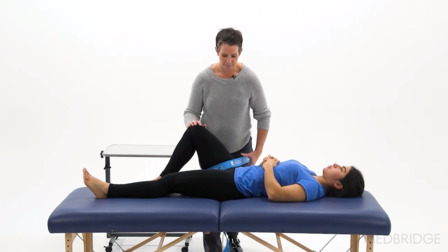Evidence-Based Treatment of the Lumbar Spine: An Update
Presented by Chad Cook
12-Month Subscription
Unlimited access to:
- Thousands of CE Courses
- Patient Education
- Home Exercise Program
- And more
Non-Financial: Chad Cook is a senior associate editor for BJSM and is an editorial board member for J Physiotherapy and JMMT.
In this course, learners will experience the recommended evidence-based interventions for the lumbar spine. Users will recognize the more prevalent lumbar pathologies seen in musculoskeletal practice and understand the proposed benefits to classifying lumbar conditions through use of the Pain and Disability Drivers Management model. Techniques used to target the primary impairment are explained, as well as the adjunctive techniques used to target the primary impairment and secondary contributors, and the techniques used to target global conditional issues. Learners will analyze the effectiveness of each technique for treatment within the designations of pain and disability domains. Throughout the course, current research is presented to provide learners with the proper tools for evidence-based management of these patients. This course is part of a comprehensive clinical series covering examination and intervention for the cervical, thoracic, and lumbar spine, as well as the upper (shoulder, elbow, wrist, and hand) and lower (hip, pelvis, knee, foot, and ankle) quarters.
Meet your instructor

Chad Cook
Dr. Cook is a professor at Duke University with a Category A appointment in the Duke Clinical Research Institute and an adjunct appointment in the Department of Population Health Sciences. He is a clinical researcher, physical therapist, and profession advocate with a long history of clinical care excellence and service and…
Chapters & learning objectives

1. Common Pathologies of the Lumbar Spine
In this chapter, learners will recognize the more prevalent lumbar pathologies seen in musculoskeletal practice. One of the key goals is geared toward understanding the etiology behind each of the pathologies, and the prognosis of each pathology.

2. Pain and Disability Drivers of the Lumbar Spine
The primary pain and disability drivers for the lumbar spine include: 1) nociceptive pain elements, 2) neuropathic pain elements, 3) comorbidity pain and disability elements, 4) mood and cognitive pain and disability elements, and 5) social and environment factors that influence disability. Each of the domains specific to the lumbar spine is discussed.

3. Interventions Directed at Impairments and to the Joint Experiencing the Impairment
This chapter reviews the techniques used to target pain relief or strength specifically toward the region that is impaired within the lumbar spine. This chapter will analyze the effectiveness of each technique for treatment within the local impairment classification.

4. Regional Interventions Directed at Structures That Mediate the Impaired Level
In this chapter, learners will review the adjunctive techniques used to target the primary impairment and secondary contributors. Learners will analyze the effectiveness of each technique for treatment within the regional designation.

5. Global-Body or Whole-Person-Directed Interventions
Within this chapter, the focus is less on the impairment and more on motor control, proprioception, cognitions, behaviors, and whole-body conditioning. Learners will review techniques associated with lifestyle medicine, global management, and cognitive-behavioral approaches.
More courses in this series

Crucial Factors Influencing Health & Recovery in Musculoskeletal Care
Chad Cook

Evidence-Based Examination of the Cervical Spine: An Update
Chad Cook

Evidence-Based Treatment of the Cervical Spine: An Update
Chad Cook

Cervical Spine Examination and Treatment: Cases to Synthesize Learning
Chad Cook

Evidence-Based Examination of the Thoracic Spine: An Update
Chad Cook

Evidence-Based Treatment of the Thoracic Spine: An Update
Chad Cook

Thoracic Spine Examination and Treatment: Cases to Synthesize Learning
Chad Cook

Evidence-Based Examination of the Lumbar Spine: An Update
Chad Cook

Evidence-Based Treatment of the Lumbar Spine: An Update
Chad Cook

Lumbar Spine Examination and Treatment: Cases to Synthesize Learning
Chad Cook

Evidence-Based Examination of the Elbow, Wrist, and Hand: An Update
Chad Cook

Evidence-Based Treatment of the Elbow, Wrist, and Hand: An Update
Chad Cook

Elbow, Wrist, and Hand Examination and Treatment: Cases to Synthesize Learning
Chad Cook

A Primer on Exercise and Treatment Prescription
Alexis Wright

Evidence-Based Examination of the Hip: An Update
Alexis Wright

Evidence-Based Treatment of the Hip: An Update
Alexis Wright

Hip Examination and Treatment: Cases to Synthesize Learning
Alexis Wright

Evidence-Based Examination of the Foot and Ankle: An Update
Alexis Wright

Evidence-Based Treatment of the Foot and Ankle: An Update
Alexis Wright

Foot and Ankle Examination and Treatment: Cases to Synthesize Learning
Alexis Wright

Evidence-Based Examination of the SIJ/Pelvis
Alexis Wright

Evidence-Based Treatment of the SIJ/Pelvis
Alexis Wright

A Primer on Examination and Treatment Metrics
Eric Hegedus

Evidence-Based Examination of the Shoulder: An Update
Eric Hegedus

Special Tests of the Shoulder
Eric Hegedus

Evidence-Based Treatment of the Shoulder: An Update
Eric Hegedus

Management of the Shoulder: Case-Based Vignettes
Eric Hegedus

Evidence-Based Examination of the Knee and Thigh: An Update
Eric Hegedus

Special Tests of the Knee
Eric Hegedus

Evidence-Based Treatment of the Knee and Thigh: An Update
Eric Hegedus

Management of the Knee and Thigh: Case-Based Vignettes
Eric Hegedus